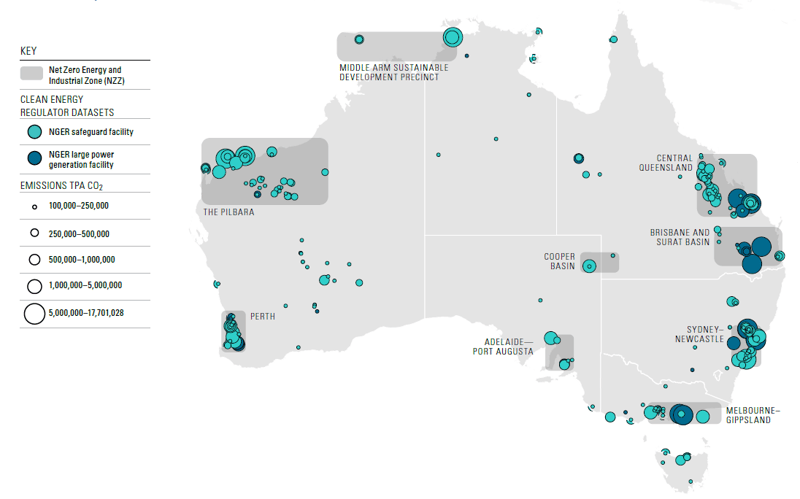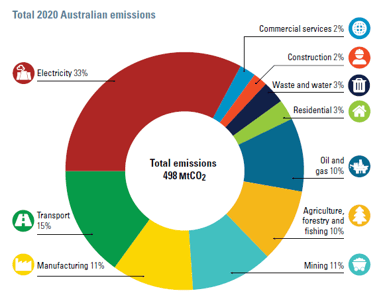Fast-tracking emissions reductions through net zero energy & industrial zones
The Australian Petroleum Production & Exploration Association (APPEA) is the peak national body representing Australia’s oil and gas exploration and production industry. As the debate over how Australia reaches net zero continues to intensify, APPEA has released a report to input into discussion and thinking on the building blocks required to reach climate goals. APPEA’s latest report, A Review of Net Zero Energy & Industrial Zones, is an interim scoping study developed by APPEA with technical support from the Commonwealth Scientific and Industrial Research Organisation (CSIRO).
The review’s analysis will be used as a foundation for discussions and engagement with governments, industry and stakeholders across the regions.
The report reveals how nine new Net Zero Zones - based around existing resources, industrial and manufacturing regions - could be established with shared infrastructure for natural gas, renewables, carbon capture utilisation and storage (CCUS) technology and low-carbon hydrogen production.
These zones could be created across Australia to bring together manufacturing and industry, energy producers, and emissions reduction technologies, to boost the net zero economy transformation and to ensure we can reach our shared climate targets as efficiently and affordably as possible.
 Possible zones could be located in Adelaide-Port Augusta and the Cooper Basin in South Australia; Perth and the Pilbara in WA; Melbourne-Gippsland in southern Victoria; Sydney-Newcastle in NSW; Brisbane and the Surat Basin as well as Central Queensland; and the planned Middle Arm Sustainable Development Precinct near Darwin.
Possible zones could be located in Adelaide-Port Augusta and the Cooper Basin in South Australia; Perth and the Pilbara in WA; Melbourne-Gippsland in southern Victoria; Sydney-Newcastle in NSW; Brisbane and the Surat Basin as well as Central Queensland; and the planned Middle Arm Sustainable Development Precinct near Darwin.
Driving down emissions
These nine energy and industrial regions around Australia comprise 92% of all Safeguard Mechanism emissions as well as 98% of all large power generation emissions. 
The majority of emissions sources in these regions and across Australia require the same four net zero technology building blocks:
• Renewable energy
• Natural gas
• Carbon capture, utilisation and storage
• Low-carbon hydrogen
Establishing these zones based around these building blocks and shared infrastructure could provide a range of benefits to support the equitable and efficient transformation to a net zero economy:
• reducing the costs and timelines for reaching net zero
• powering regional manufacturing and industry, creating and protecting regional jobs
• underpinning net zero critical mineral production and processing
• leveraging existing infrastructure
• creating a magnet for regional net zero investment
• providing focal points for streamlined government approvals and environmental permitting
• establishing the foundations for net zero energy and industrial exports and imports
Net Zero Zones could provide a framework for rapid, cost-efficient emissions reductions and regional development across Australia.
Deploying all technology tools is vital
The report highlights net zero will require every emissions reduction tool in the toolbox.
Meeting net zero will require a scale up in technology at a rate never seen before. Renewable energy sources will do much of the heavy lifting, particularly in the power sector.
However, to get to net zero, the International Energy Agency (IEA), the Intergovernmental Panel on Climate Change (IPCC) and the International Renewable Energy Agency (IRENA) are all clear that renewable energy will need to be complemented by energy efficiency, low-carbon hydrogen, CCUS, natural gas, and a range of other technologies.
Carbon dioxide removal (CDR)—negative emissions—technologies will also be required to address residual emissions in the economy. Scaling up and rolling out these technologies will require unprecedented coordination and collaboration—between jurisdictions, across government, between government and industry, and between sectors.
Fast-tracking net zero
Net Zero Zones could help Australia accelerate to net zero and seize the economic opportunities of the energy transformation.
In a way, it’s like carpooling carbon emissions by working together to help achieve net zero in the fastest and most cost-efficient way for the economy.
The zones could become magnets for regional investment and provide a framework for different industries to work together to speed up the path to net zero.
They would involve collaboration across different industries. It is about thinking wholistically about emissions reductions in these regions.
The analysis confirms the important role of the gas industry and what it can contribute to the net zero challenge – cleaner energy and back up for renewable electricity while our infrastructure and expertise can help deliver step-change technologies such as CCUS and low-carbon hydrogen production.
Leveraging existing infrastructure can ensure regions that powered the Australian economy to where it is today won’t be left behind as we restructure our economy for the future.
Energy Monthly
Get a different perspective on energy with our monthly newsletter.
Up next
.png)

Creating clarity during the energy transition.
Get a different perspective on energy with our monthly newsletter.

All rights reserved Energy Insights Pty Ltd




